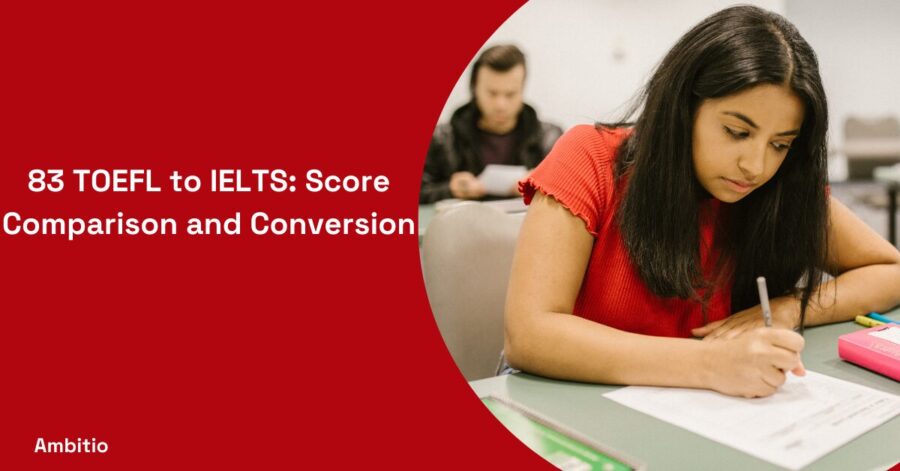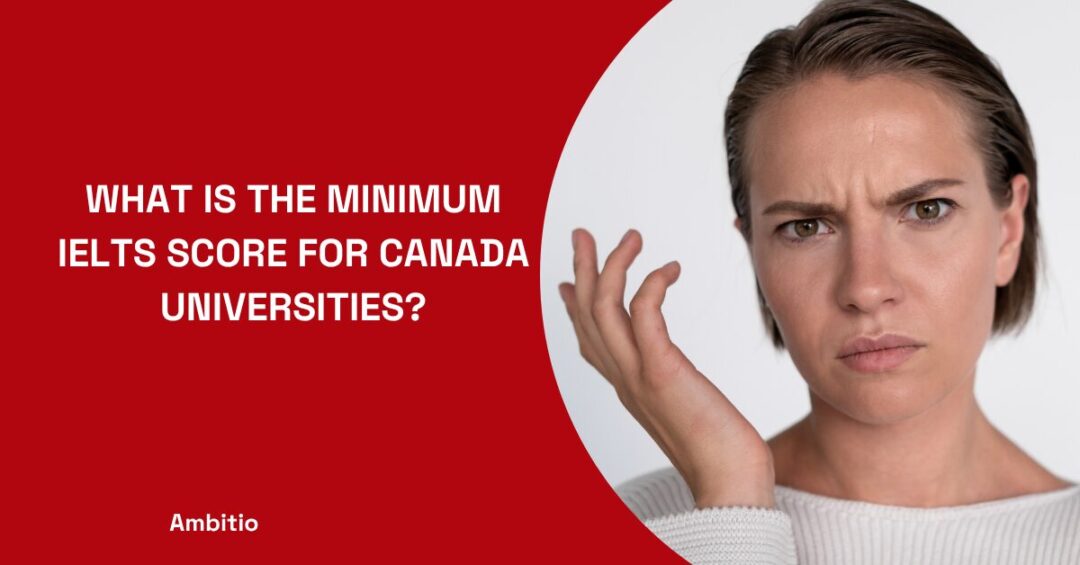14 December 2024
5 minutes read
83 TOEFL to IELTS: Score Comparison and Conversion

Introduction
When it comes to English language proficiency tests, TOEFL (Test of English as a Foreign Language) and IELTS (International English Language Testing System) are two of the most popular choices for international students.
If you’ve achieved a TOEFL score of 83 and are considering IELTS, this comprehensive guide will provide you with valuable insights into the conversion process and what to expect when making the transition.
TOEFL vs. IELTS: Understanding the Basics
Before delving into score conversion, it’s essential to understand the fundamental differences between TOEFL and IELTS.
| Aspect | TOEFL | IELTS |
|---|---|---|
| Test Format | Internet-Based Test (iBT) | Paper-Based Test (PBT) and Computer-Based Test (CBT), or Computer-Delivered (iBT) |
| Scoring Range | 0-120 | 0-9 (with half-band scores) |
| Sections | Reading, Listening, Speaking, Writing | Listening, Reading, Writing, Speaking |
| Scoring Method | Each section scored 0-30 | Each section scored 0-9 |
| Speaking Assessment | Recorded responses evaluated by human raters | Face-to-face speaking assessment with trained examiners |
| Writing Assessment | Typing responses on a computer | Handwriting responses on paper (PBT) or typing on a computer (CBT/iBT) |
| Test Length | Approximately 3 hours | Approximately 2 hours and 45 minutes |
| Test Delivery | Computer-Based (iBT) or Paper-Based (PBT/CBT) | Computer-Delivered or Paper-Based |
| Score Validity | Typically 2 years | Typically 2 years |
| Test Availability | Frequent test dates throughout the year | Multiple test dates throughout the year |
| Score Reporting | Online within 6-10 days | Online within 13 days |
| Regional Popularity | Commonly used in North America | Widely accepted globally |
| Speaking Accent | Includes American, British, and Australian accents | May include various English accents |
| Test Cost | Varies by location and test center | Varies by location and test center |
| Test Preparation | Official ETS materials, third-party prep courses, and practice tests available | Official Cambridge materials, third-party prep courses, and practice tests available |
| Test Preference by Institutions | Some institutions prefer TOEFL | Some institutions prefer IELTS |
| Overall Impression | More computer-based, with a focus on academic English | Incorporates real-life language skills, with a focus on practical communication |
Score Comparison: TOEFL 83 to IELTS
To convert your TOEFL score of 83 to its IELTS equivalent, you’ll need to refer to a conversion table. Keep in mind that institutions may have varying score requirements, so it’s crucial to check their specific criteria.
TOEFL Score Conversion Table
Here’s a detailed conversion table to help you understand how your TOEFL score of 83 compares to IELTS:
| TOEFL iBT Score | IELTS Equivalent |
|---|---|
| 0-9 | 0-1.0 |
| 10-14 | 1.5 |
| 15-18 | 2.0 |
| 19-23 | 2.5 |
| 24-30 | 3.0 |
| 31-38 | 3.5 |
| 39-46 | 4.0 |
| 47-54 | 4.5 |
| 55-62 | 5.0 |
| 63-78 | 5.5 |
| 79-93 | 6.0 |
| 94-101 | 6.5 |
| 102-109 | 7.0 |
| 110-114 | 7.5 |
| 115-118 | 8.0 |
| 119-120 | 8.5-9.0 |
Please note that this conversion table provides an approximate equivalent and that the actual IELTS score requirement may vary from institution to institution. It’s advisable to contact the educational institution you plan to apply to and inquire about their specific requirements.
Understanding the Conversion
It’s crucial to understand that the TOEFL and IELTS scoring systems are not directly comparable due to their distinct structures. While TOEFL provides a single total score, IELTS evaluates your proficiency in four separate skills.
For example, a TOEFL score of 83 could mean different things for each section of the test. You might excel in reading and listening but struggle with speaking and writing. In contrast, IELTS provides a more nuanced assessment, with individual scores for each skill.
When converting your TOEFL score to IELTS, institutions often consider the total TOEFL score and apply a conversion formula to estimate the equivalent IELTS band score. However, keep in mind that this is an approximate conversion, and individual institutions may have their own methods and criteria.
The Importance of Score Conversion
Understanding score conversion is crucial for international students for several reasons:
Admission Requirements
Many universities and colleges worldwide require English language proficiency as a prerequisite for admission. By knowing the equivalent IELTS score of your TOEFL score, you can determine whether you meet the institution’s requirements.
Scholarship Eligibility
Some institutions offer scholarships based on English proficiency test scores. By converting your TOEFL score to IELTS, you can determine your eligibility for these financial opportunities.
Program Placement
In addition to general admission, specific academic programs or departments within institutions may have their own English language proficiency requirements. Understanding the conversion allows you to choose programs aligned with your language skills.
Visa Applications
When applying for a student visa in certain countries, English language proficiency may be a requirement. Accurate score conversion ensures that you meet the visa application criteria.
Factors Affecting Score Conversion
Several factors can influence the conversion of TOEFL scores to IELTS scores. It’s essential to consider these variables when interpreting your converted score:
- Institution’s Criteria
- Different universities and colleges may have their own conversion methods or requirements. Some institutions may use conversion tables, while others may rely on their assessment of the two tests.
- Different universities and colleges may have their own conversion methods or requirements. Some institutions may use conversion tables, while others may rely on their assessment of the two tests.
- Test Version
- TOEFL has evolved over the years, with different versions like PBT (Paper-Based Test) and CBT (Computer-Based Test) preceding the current iBT format. The version of TOEFL you took may impact the conversion process.
- TOEFL has evolved over the years, with different versions like PBT (Paper-Based Test) and CBT (Computer-Based Test) preceding the current iBT format. The version of TOEFL you took may impact the conversion process.
- Sectional Strengths and Weaknesses
- Your performance in specific TOEFL sections (Reading, Listening, Speaking, Writing) can vary. Institutions may consider this when converting scores to assess your language proficiency accurately.
- Your performance in specific TOEFL sections (Reading, Listening, Speaking, Writing) can vary. Institutions may consider this when converting scores to assess your language proficiency accurately.
Preparing for the IELTS
If you’ve decided to take the IELTS after achieving a TOEFL score of 83, it’s essential to prepare adequately. Here are some tips to help you succeed in the IELTS:
- Understand the IELTS Format
- Familiarize yourself with the IELTS test format, including the types of questions and tasks in each module. Knowing what to expect will boost your confidence.
- Familiarize yourself with the IELTS test format, including the types of questions and tasks in each module. Knowing what to expect will boost your confidence.
- Take Practice Tests
- Practice makes perfect. Take official IELTS practice tests to gauge your current proficiency level and identify areas that need improvement.
- Practice makes perfect. Take official IELTS practice tests to gauge your current proficiency level and identify areas that need improvement.
- Focus on Weaker Areas
- If certain skills (e.g., speaking or writing) were your weaker points in the TOEFL, dedicate extra time to improving them for the IELTS.
- If certain skills (e.g., speaking or writing) were your weaker points in the TOEFL, dedicate extra time to improving them for the IELTS.
- Enroll in Preparation Courses
- Consider enrolling in IELTS preparation courses. These courses provide structured guidance and practice materials to help you excel in the test.
- Consider enrolling in IELTS preparation courses. These courses provide structured guidance and practice materials to help you excel in the test.
- Time Management
- IELTS requires you to manage your time effectively, especially in the Writing and Reading sections. Practice time management to complete tasks within the allocated time limits.
- IELTS requires you to manage your time effectively, especially in the Writing and Reading sections. Practice time management to complete tasks within the allocated time limits.
Conclusion
Converting a TOEFL score of 83 to its IELTS equivalent is a critical step for international students pursuing education in English-speaking countries. Remember that while conversion tables provide estimates, specific institution requirements may vary. It’s advisable to research your target institutions thoroughly and prepare accordingly to meet their standards.
By understanding the conversion process and diligently preparing, you can confidently pursue your academic goals in English-speaking institutions around the world.
Whether you choose TOEFL or IELTS, your English language proficiency is a valuable asset that opens doors to educational and career opportunities.
FAQs
Q1: Can IELTS and TOEFL scores be directly compared?
While there is no one-to-one correlation between TOEFL and IELTS scores, conversion tables can help provide an approximate equivalence. However, institutions may have their own preferences, so always check their requirements.
Q2: Are there any differences in test format between TOEFL and IELTS?
Yes, there are differences in test format and structure. TOEFL iBT is entirely computer-based, while IELTS includes face-to-face speaking assessments. Understanding these distinctions is essential when choosing a test.
Q3: Can I improve my TOEFL or IELTS score if it’s below the required level?
Yes, you can improve your score by preparing thoroughly. Consider taking preparation courses, practicing regularly, and seeking guidance from experts in English language proficiency.
Q4: How long does it take to prepare for the IELTS if I’ve already taken the TOEFL?
The duration of preparation depends on your current proficiency level and the score you aim to achieve in the IELTS. On average, a few months of dedicated preparation should suffice.
Q5: Are there any advantages to taking both TOEFL and IELTS?
Taking both tests can provide you with flexibility in your university applications. Some institutions accept either TOEFL or IELTS scores, allowing you to choose the test in which you perform better.

You can study at top universities worldwide!
Get expert tips and tricks to get into top universities with a free expert session.
Book Your Free 30-Minute Session Now! Book a call now




























